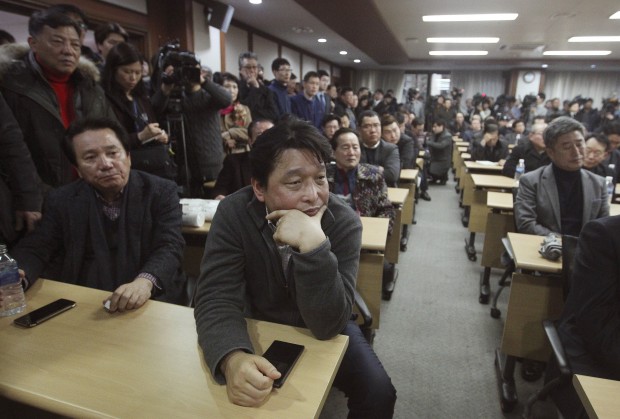Tension rises between South and North Korea over Gaesong complex

South Korean owners who run factories in the suspended inter-Korean Kaesong Industrial Complex, attend an emergency meeting held by the council of South Korean companies operating in the industrial park, in Seoul, South Korea, Friday, Feb. 12, 2016. North Korea on Thursday ordered a military takeover of a factory park that had been the last major symbol of cooperation with South Korea, calling Seoul’s earlier suspension of operations at the jointly run facility as punishment for the North’s recent rocket launch a “dangerous declaration of war.”(AP Photo/Ahnn Young-joon)
North Korea expelled South Korean workers from the Gaeseong Industrial Complex (GIC) and froze all South Korean-owned property there, Thursday, retaliating against the South’s decision to shut down the complex the previous day.
Pyongyang also designated the area an off-limits military zone, and cut off communication lines between the two Koreas.
“We ordered all South Korean personnel to leave the GIC by 5 p.m. [local time], Thursday,” the North said in a statement issued by the Committee for the Peaceful Reunification of Korea, which handles inter-Korean affairs.
The statement came as South Korean firms there were pulling out their assets based on the government’s decision. Some of 280 South Korean officials and workers remained at the complex after 5 p.m., but all of them returned home safely afterwards.
“We decided to freeze all assets belonging to South Korean enterprises and related organizations, including their machinery, raw materials and products. Those who are deported can take nothing but their personal possessions,” the statement read.
“When the South Koreans leave, we’ll cut off inter-Korean military hotlines, and then the dialogue channel set up at the truce village of Panmunjeom.
“The South Korean enemy forces will experience themselves the harsh and painful price they should pay for halting the Kaesong industrial complex,” it said.
The South decided to shut down the complex, Wednesday, to punish Pyongyang for its launching of a long-range rocket, Feb. 7.
The launch was regarded by other nations as a U.N.-banned ballistic missile test. The Park Geun-hye administration suspects that the GIC, which has been a symbol of inter-Korean reconciliation, has been Kim Jong-un regime’s major source of hard currency to finance the rocket launch and also its latest nuclear test, Jan. 6.
The 124 enterprises, most of them small- and medium-sized enterprises employed 54,000 North Korean employees. North Korea said it had pulled out all of its laborers from the GIC.
A Cheong Wa Dae official said it was predictable that the reclusive state would take a retaliatory move.
The Ministry of Unification said its officials helped South Koreans at the GIC return home safely.
The military said they have enhanced their readiness posture to cope with heightened tension on the peninsula.
“Our findings show that North Korea has also has fortified its readiness posture on the border near Gaeseong before it announced the deportation of our nationals,” a military official said. “There has been increased military activity in the area as well and we’re preparing for Pyongyang’s possible provocations.”
Prior to North Korea’s announcement, negotiators from the two Koreas had been discussing follow-up measures in response to the South’s measure to stop operations at the GIC.
The complex has been a symbol of inter-Korean reconciliation since its opening in 2004 in line with an inter-Korean summit in June 2000.
It last shut down in April 2013 when North Korean Kim Jong-un pulled the workforce there for Seoul allegedly offending the leader.
Seoul has invested 1.19 trillion won ($850.9 million) on both the government and civic level since the GIC opened in 2004, including 616 billion won in cash, according to the unification ministry.
(This article was originally published in The Korea Times)










































